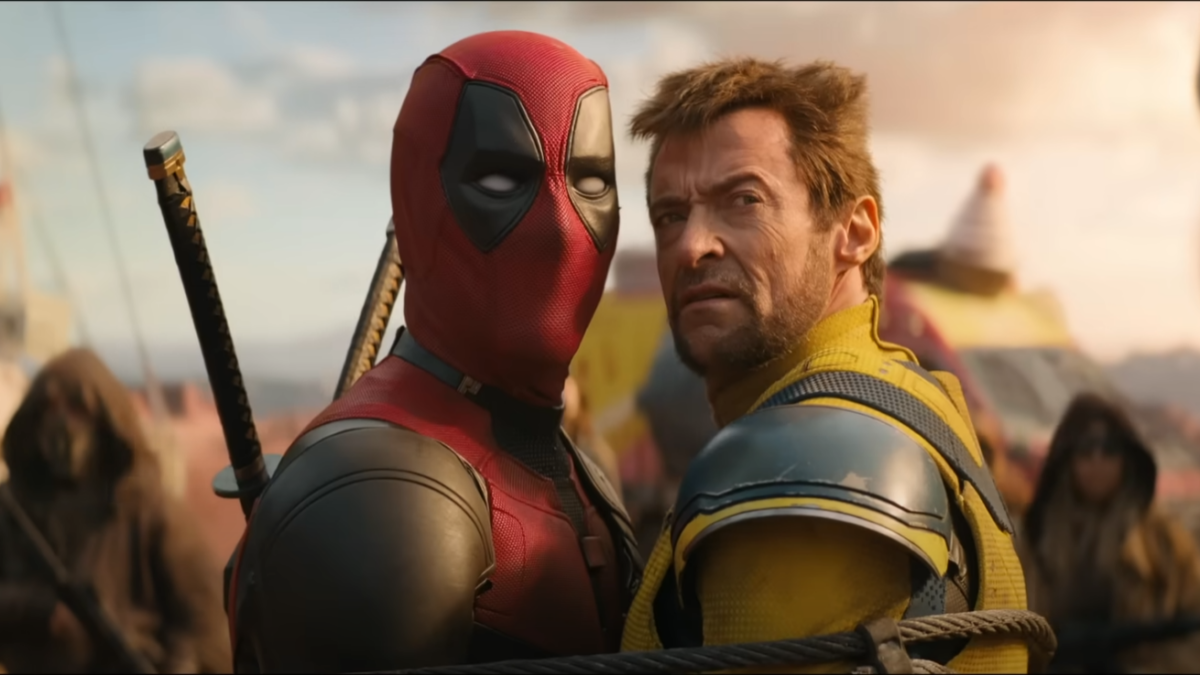
The year is 2016 and we’re still a bunch of audiences in search of stories who nevertheless don’t take chances on things we haven’t seen yet. Our age is obsessed with novelty, but we’re always stuck with more of the same. We should be looking for more opportunities to be pleasantly surprised. Above all, we need to speak up about that just in case someone is listening.
We are the people who pay through the nose for more Star Wars, only to get about the same Star Wars they had in the 1970s. Part of that is the enthusiasm of a moment in which we can all fit, so to speak, something that billions of people can have in common. No wonder people get enthusiastic about that!
On the other hand, it also feels like stagnation. Who would have thought that what people thought of as revolutionary would in another generation look rather reactionary? The stakes here are real even if they’re hard to grasp, because we are a society partly because we are audiences of the same super-popular spectacles. Every billion-dollar spectacle is at some level a confirmation of the authority of the people. We’re just not really happy with our choices.
What Boomers and Millennials Want, and Why
Of course, our age has new Star Treks that are retellings of the old Star Treks, too. Boomers to an extent defined themselves by telling younger people “You had to be there!” Now, at the movies, we get to do it.
There’s something to be said for nostalgia and for the attempt to update cultural touchstones. But there’s a subtle danger in movie remakes. It’s that we get to have our own cultural pilgrimages without learning any of the lessons that have chastened the Boomers.
One could probably make money blaming Boomer nostalgia for a lot of what’s wrong, if profitable, with the movies. But that’s not going to change either the industry or the public taste. Likely, the kind of generational reconciliation you could get with better remakes is preferable to anything that could come from blame and anger. It’s probably better to say we’re really hopeful collectors, and bound to be disappointed. We can live with that, learn from both facts, and move forward in a better direction.
Millennials do resemble Boomers in their sense of safety. The lady with the Harry Potter books is back with more of the same stuff they loved as kids, after a brief interlude in which she tried to be an adult writer. So after eight—count’ em—Harry Potter movies, the future is pretty much on repeat, with at least a couple more trilogies in the works.
The disappointment concealed in these repetitions turns into a kind of defensive attitude, a joyless possessiveness: there may not be much more to get out of story-telling than what we’ve already got and more or less secretly found wanting, but we’re going to hold on to these things, because they’re the only things we’ve got.
In a way, this means J.K. Rowling will keep making money while newer writers will have fewer chances to offer us something new. But if people remember what pleasures came out of the schoolboy nostalgia of Harry Potter and how the British past, gussied up, was really news to Americans, that’s the sort of thing that could guide people to better adventure stories. That’s one part of a future worth pursuing for writers and audience alike. Moving from brand and franchise to genre is the key to unleashing the freedom to write without tyrannizing the audience with obscurities.
Remakes Mean We Want to Keep What Is Good
The age of remakes and repeats is the age when we learn that the future scares and confuses us. Despite the failure of imagination remakes suggest, they also offer us some guidance for judging our taste and ambitions. Our society and our politics are remarkably divided, so it shouldn’t come as a shock that our storytelling is also confused.
But it’s more easily fixed, too, because it speaks to how we think about ourselves and see the future independently of partisanship or the desire for revenge or the fear that our adversaries have a choke-hold on our future. It is precisely because popularity at the movies is still unquestioned, innocent in a way that politics is not, that it can help bring people together.
The movies, of course, are not transformational, but they’re better than merely therapeutic lies or likely stories. Movies are somewhere in-between. They show us and our world without some of the encumbrances of life. In that sense, they’re basically idealistic and aspirational.
It’s not an accident that we turn to remakes and sequels, trying to repeat good things or hold on to them; nor that the failures of our storytelling concentrate in two places: foolish hopes we cannot believe in or hopes so badly disappointed they turn to despair. We can probably find an in-between kind of ending that’s more true to life without abandoning the clarifying illusions of storytelling.
We’re trying in various ways, some more organized and promising than others. One good sign that remakes and repeats are now the dominant force in storytelling is the dizzying variety of the offering at the movies, on TV, and in the new realm of online series. Nothing has really coalesced yet, but maybe that’s because we need more clarity about our intentions, not because we suffer from some great deficiency.
Neither the movie and TV industries nor the disruptive innovators on the Internet know the recipe for what will succeed in the future. It’s good to have people trying in both categories, and it’s reassuring: someone will somehow succeed in attracting our attention, then follow up by rewarding it. So the following critique comes with an attempt to see the good even in the failures of popular entertainment. We should try to reward even mere good intentions or business savvy. Let’s consider some of the latest trends.
From Games to Movies
The trend in turning computer and video games into movies teaches us something about the character of our curiosity. We’re willing to rehearse the stories on screen, although we’re robbed of our control, because we want some sense of togetherness, to be part of a surprise that’s not going to be too surprising to bear.
We’re also secretly hoping that people who have no taste for computer games might finally get us. Fat chance of that, but there’s no taking the hope out of people. They love the stuff, and all lovers want to boast of their love and share it somehow.
Thus has yet another part of the global democracy of the Internet age marked out territory in the world of movies. This reinforces movies’ prestige: that’s where we go to see ourselves or our pursuits beautified. But it also allows various groups in our modern democracies to become a bit more public and try to put their best foot forward.
The Victorian Era Is Back
Also, the Victorian age is back on the big screen. Best-seller and Eisenhower-era prestige picture “Ben-Hur” was remade this year to thudding indifference. Failure as a guide is the democratic way. Most attempts must be failures, but they speak to the fantasies and desires that move people. There is no variety to speak of outside of remakes and repeats, so this is where we must go to see the souls of people revealed in their actions.
Speaking of the Victorians, both Rudyard Kipling’s “Jungle Book” and E.R. Burroughs’ “Tarzan” were remade again this year, the one a billion-dollar success and the other a costly failure, both devoid of the man versus civilization theme at the core of the originals. You have to go see chick flicks to see how much we secretly admire the elegance of that age. The boys just don’t get it.
If you want to see everything in-between, the desire to consume the past as repetition, you have to go to Amazon Prime or Netflix, which should tell you a lot about the middle classes of the democratic age, but that, again, is another discussion for another time.
Two Big Remakes That Failed to Different Reactions
Two big, costly remakes this year were failures at every level—commercial, critical, poetic—but received very different treatment. The 1980s “men with initiative against government bureaucracy” story “Ghostbusters” was remade with an all-female cast. Great outrage followed on both sides, which should have been good publicity, except for the inevitably political partisan fight surrounding feminism.
But the real outrage, gone unmentioned, is that it’s a boring spectacle. The new “Ghostbusters” was not the desecration of a beloved classic or a revolutionary act of poetic justice, but just something nobody can love. Who’s to say there’s no feminist spectacle in ghostbusting? The real problem is we did not learn what that spectacle might be.
The other, more important failure was “The Magnificent Seven,” which boasted a great cast. It was also an ethnically diverse spectacle, boasting a black protagonist and killing its three white protagonists by the end. Maybe all these things would fit well into a Western, but who’s to know? The real outrage with remakes is that they’re mediocre. That’s the kind of ugly truth we do not confront because we dismiss or embrace remakes without seeing them for what they are.
The importance of the Western was its reflection on the American founding and the American character revealed by the combination of freedom and necessity that characterizes the wilderness of the frontier. We could learn all sorts of things that way, including what new frontiers we might want to attempt and to civilize. The Western was always hopeful about America’s future, grounded in the American past. Even at this level, the “Magnificent Seven” remake failed.
Well, sooner or later, Americans’ interest in the past and future will come together in another genre. Meanwhile, the Western may be having the best chance for a revival it has had in more than a generation. We can only hope it’s not wasted, because it would be a real novelty to most Americans, to say nothing of the worldwide audience that cannot get enough of America on the screen. Wouldn’t that be a great way to introduce America to the world?
Remakes Indicate Our Fear of Creativity
Remakes suggest we don’t really believe in being creative, or at least that creativity is incredibly rare and cannot be mandated or demanded. They also allow us to dwell on stories we love, stories that speak to us at some level, and which, in the telling and retelling, give us a chance to learn why we love them. If we obsessed less about originality, however, we paradoxically might have better remakes because we’d treat them with more respect and therefore the storytellers involved would feel less like hacks and more like friends.
At least on some level, remakes do signal a failure of imagination. The lack of new stories is not really a problem, nor the political correctness of the remakes. These are social circumstances more than anything else. They only gain prominence when we as a society do not know what we want.
That’s where the problem is. It’s one thing for people to tell pollsters they’re not confident about the future, but it’s quite another if people can’t even get what they want at the movies! So the only thing that should cause outrage about these productions is the rampant mediocrity.
Yet this also suggests hope for our predicament, because people are not satisfied with what’s on offer. The big problem is that even people who might love old movies or games or novels do not know why or how to share that love: remakes are supposed to be works of love, after all, and people involved in movies often do not know how to love.
Honest nostalgia seems preferable at this point. It’s time to admit we don’t have some new revolutionary idea, but can nevertheless playfully enjoy ideas we’re familiar with. Yes, remakes can mean we’re not testing out new ideas about how to live. Yet this is not all a bad thing. Sometime sooner or later, somehow or other, a great story-teller is going to wow us, and our intimacy with great stories from the past is going to help form the taste for that kind of novelty.
After all, greatness is greatness. Somewhere, somehow, someone with money and guts could persuade people to take another look at the great things that have come out of Hollywood. It’s just waiting to happen. Our movie-making past has all sorts of delights; let’s get comfortable with our imitations of greatness and love them better, more honestly and with more of a mind to sharing them.









